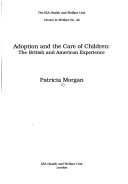Adoption is out of favour. Numbers have fallen dramatically, and baby adoptions have become rare events. Recent trends in family law make it increasingly unlikely that children will ever be declared free to be adopted, while would-be adopters are discouraged by a series of obstacles and abjections. Consequently children who are unable to live with their natural parents are likely to spend long periods - possibly their entire childhoods - 'in care'. This can entail years of to-ing and fro-ing between children's homes, foster parents, and repeated attempts to re-unite them with neglectful and often abusive parents. The results for the children concerned are extremely poor, and all the evidence suggests that the state makes a very bad substitute parent. Children who have spent time 'in care' are more prone to psychiatric disorders, they suffer in terms of education and health, and they often 'graduate' from the system to homelessness, unemployment and prison. The results for adopted children, on the other hand, are extremely good. They do well by all measures.
When they experience problems, these often relate to their early childhood trauma at the hands of their natural parents, or to long periods spent 'in care' prior to adoption. In this book Patricia Morgan argues that childcare legislation and practice should be re-organised so that adoption becomes the first, not the last, option for children who cannot live with their parents. A child welfare system for the twenty-first century should be built around finding a permanent home for every child.
- ISBN13 9780255364348
- Publish Date 19 March 1998
- Publish Status Out of Print
- Out of Print 3 May 2007
- Publish Country GB
- Imprint Civitas:Institute for the Study of Civil Society
- Format Paperback
- Pages 210
- Language English
